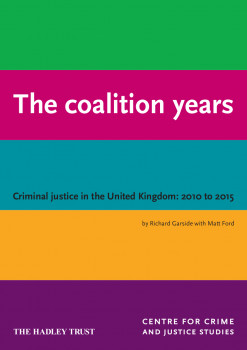The coalition years: Criminal justice in the United Kingdom

Change has swept the United Kingdom criminal justice systems over recent years. The election of the Conservative-Liberal Democrat coalition government in May 2010 drew a line under the generous budgets of the New Labour period. Austerity and cuts became the new reality. Across England and Wales, Scotland and Northern Ireland, different solutions to common criminal justice challenges emerged.
'... a fascinating commentary...'
Probation Journal
This report reviews criminal justice developments during the entire period of the Conservative-Liberal Democrat coalition government: May 2010 to May 2015. It also identifies the main challenges facing an incoming government in May 2015, regardless of which party or parties take power at the General Election. It covers the full span of developments across the United Kingdom, seeking to explain why criminal justice developed in the way that it did, rather than dwelling on the detail of what happened.
The report does not attempt a detailed history, nor does it cover all areas of criminal justice. Instead, it simplifies a much more complex reality, foregoing a comprehensive account of all developments in the interests of gaining a general understanding of the underlying movements. It undertakes this simplification in two ways.
First, it focuses on signal criminal justice developments in the areas of policing, punishment and legal aid. Across the three criminal justice jurisdictions there was major activity in the areas of police reform, prisons and community supervision, and provision of criminal legal aid. This report examines how criminal justice in these three areas developed in sometimes convergent, often divergent ways.
Second, it seeks to explain developments by reference to the distinctive underlying priorities in each jurisdiction. In England and Wales this was an approach that placed market forces at the centre of criminal justice delivery. In Scotland the state was seen as central to criminal justice delivery. In Northern Ireland, criminal justice developments were dominated by a political agenda to move from a divided society characterised by civil conflict to an inclusive society underpinned by the rule of law.
The process of criminal justice reform is, at heart, a political project, shaped by, and shaping in its turn, a complex array of economic, cultural, historical and ideological influences. It is this articulation of the political and the criminal justice, during the period 2010 to 2015, that this report seeks to draw out.
UK Justice Policy Review
The Coalition Years forms part of the UK Justice Policy Review programme of activities. It supplements the annual reports. These reports are is required reading for anyone looking for an accessible overview of criminal justice developments across England, Scotland, Wales and Northern Ireland.
Now in its fourth year, UK Justice Policy Review combines analysis of the main developments in policing, courts, prisons, probation and welfare with detailed data sections covering the main facts, figures and trends.
It complements the annual UK Justice Policy Review reports, published by the Centre for Crime and Justice since the coalition government came to power in May 2010. To date, four of these reports have been published, covering the first, second, third and fourth years of the coalition government. They offer an annual assessment of what happened in criminal justice, across the United Kingdom, in the given year under review.
This report is different. It covers the full span of developments across the United Kingdom, seeking to explain why criminal justice developed in the way that it did, rather than dwelling on the detail of what happened. The narrow focus description of policy developments found in the annual reports is replaced, in this publication, by a wider focus examination of the reasons for these developments. As a result this report eschews detail for the big picture, dwelling on policy specifics only when they help to explain the underlying connections and dynamics.